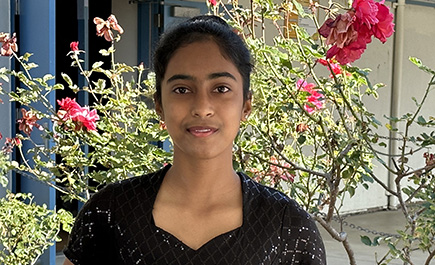(October 28, 2023) The ninth grader at Lynbrook High School in San Jose was in for a surprise when she won second place at the 2023 3M Young Scientist Challenge. Shripriya Kalbhavi has been working on her invention – EasyBZ for a while now, but had no idea that it would win her a spot at America’s biggest middle school science competition. The Indian-American teen will receive a cash prize of $2000 for developing a cost-effective microneedle patch that allows for self-automated drug delivery without pills or needles.
“I am really passionate about making sure that everyone is comfortable with the medical treatment that they are receiving, and I really want people to have long-term solutions to their chronic conditions. With the EasyBZ microneedle patch, I have always hoped that people can receive painless treatment that accommodates their medical needs, whether it be children who have diabetes or adults who suffer from forms of dementia like Alzheimer’s,” she wrote in a blog. For someone who has always been keen to contribute to society, she found her answer in science and research.

Growing up, Shripriya was scared of needles and hated getting injections. It not only made her uncomfortable but also induced a sense of fear in her. She realised that many people, especially children, like her who feared needles had no solution other than being told they had to face their fears. “For me, it was not very fun to have a huge needle being stuck into my arm. It was uncomfortable and frightening, and I don’t think that anyone should have to deal with something that makes them feel like their pain, fear, or struggles are less than worthy of care.” Moreover, seeing This didn’t sit right with her and she decided to come up with EasyBZ microneedle patch, “which actively delivers medication to patients painlessly and can deliver doses over a long period of time.”
“Microneedles reduce the pain factor, while the Belousov-Zhabotinsky reaction, along with an oscillating hydrogel, helps manage doses and actively deliver medication,” added Shripriya who was keen to help people who require long-term injections. “Such as kids with diabetes, by making their insulin therapy more convenient or something that could also benefit those who cannot take medications on their own, such as dementia or Alzheimer’s patients. Hypodermic needles can be a real pain. I really wanted to redesign this problem and help many people in the process. In addition, I also wanted to take into consideration the pain and fear aspect of it.”
It was in November 2022 that Shripriya started playing around with the idea of a microneedle patch that autonomously delivers medication using a self-oscillating hydrogel back. She spent hours researching drug delivery methods, hydrogels, and microneedle technologies. “Understanding how things already work and their limitations sparked new ideas for my project. Research guided me in designing the most effective prototypes.” However, she was still unsure of the materials that she could use to make the prototype. That’s when her mentor Dr. PJ Flanigan stepped in and helped turn her idea into a possible solution. “The summer mentorship is what really has allowed me to take my project to the next level. With the advice and help of my mentor, Dr. PJ Flanigan, as well as all of the 3M materials that have helped me put together my prototypes, I have been able to level up my project in terms of design, efficiency, results, chemistry, and more. With the help of a 3M scientist, I feel like my project has an even greater potential to help so many people,” she added.
- Follow Shripriya Kalbhavi on LinkedIn




